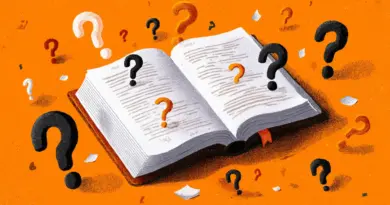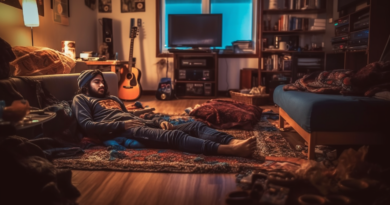Vídeo | How can I speak English more fluently?
Descubra como falar inglês com mais fluência seguindo dicas práticas e realistas que transformam sua comunicação. Este vídeo do canal BBC Learning English explora métodos eficazes para aprimorar sua habilidade de falar sem pausas, utilizando expressões informais e praticando com palavras comuns. Desde dialogar com outras pessoas até conversar consigo mesmo em casa, as estratégias se adaptam a qualquer situação, fazendo com que você a soe mais natural e confiante.
| Audio | |
|---|---|
Normal | Slow |
| English Transcript | Tradução |
| How can you speak English more fluently? | Como você pode falar inglês com mais fluência? |
| Here's a question from Mary. | Aqui está uma pergunta de Mary. |
| That was Mary's question. | Essa foi a pergunta de Mary. |
| But we also want your questions. | Mas também queremos suas perguntas. |
| You can send us a question to learningenglish@bbc.co.uk. | Você pode nos enviar uma pergunta para learningenglish@bbc.co.uk. |
| But now, on to speaking fluency. | Mas agora, sobre a fluência na fala. |
| Let's go. | Vamos lá. |
| So what does 'fluently' mean? | Então, o que significa 'fluente'? |
| Well, if you can speak fluently, you can speak easily without many pauses. | Bem, se você consegue falar fluentemente, você consegue falar facilmente sem muitas pausas. |
| So let's look at five ways you can speak English more fluently. | Então, vamos ver cinco maneiras de falar inglês com mais fluência. |
| Learn informal expressions and practise using them. | Aprenda expressões informais e pratique usá-las. |
| For example, you could make a target of learning five a month. | Por exemplo, você poderia estabelecer a meta de aprender cinco por mês. |
| It's really raining. | Está realmente chovendo. |
| No, it's chucking it down. | Não, está caindo o céu. |
| How are you? | Como você está? |
| How's it going? | Como estão as coisas? |
| How's it going? | Como estão as coisas? |
| How's it going? | Como estão as coisas? |
| Hey, how's it going? | Ei, como estão as coisas? |
| Use words like 'actually' and 'basically'. | Use palavras como 'na verdade' e 'basicamente'. |
| They give you more time to think and they'll make you sound more fluent. | Elas te dão mais tempo para pensar e fazem você soar mais fluente. |
| Basically, I don't want to go out while it's raining. | Basicamente, eu não quero sair enquanto está chovendo. |
| Actually, I'll just go. | Na verdade, estou indo. |
| Yeah. | Sim. |
| Bye. | Tchau. |
| Fluent speakers of English use the /ə/ sound a lot. | Falantes fluentes de inglês usam o som /ə/ muito. |
| We call it 'schwa', and we also use linking to connect words together. | Nós o chamamos de 'schwa', e também usamos como ligação para conectar palavras. |
| Like this: A cup of tea. | Assim: Uma xícara de chá. |
| A cup of tea. | Uma xícara de chá. |
| A cup of tea. | Uma xícara de chá. |
| A cup of tea. | Uma xícara de chá. |
| That is a good cup of tea. | Essa é uma boa xícara de chá. |
| How are you? | Como você está? |
| How are you? | Como você está? |
| How are you? | Como você está? |
| /ə/, /ə/. | /ə/, /ə/. |
| how /ə/, how /ə/. | como /ə/, como /ə/. |
| How are you? | Como você está? |
| How are you? | Como você está? |
| Practice everywhere. | Pratique em todos os lugares. |
| Talk to people around you. | Converse com pessoas ao seu redor. |
| Sian, if you could have any superpower, what would it be? | Sian, se você pudesse ter qualquer superpoder, qual seria? |
| Ah, that's a good question. | Ah, essa é uma boa pergunta. |
| Or even talk to yourself while you're at home. | Ou até mesmo fale consigo mesmo enquanto está em casa. |
| What are you doing? | O que você está fazendo? |
| You can also talk to yourself or other people on the phone. | Você também pode falar consigo mesmo ou com outras pessoas ao telefone. |
| So I'm washing up. | Então, eu estou lavando a louça. |
| Uh, this is a mug because I just had a coffee, but I have to wash a saucepan, a wooden spoon. | Uh, isso é uma caneca porque eu acabei de tomar um café, mas eu tenho que lavar uma panela, uma colher de pau. |
| I have loads of washing up, and I'm talking to myself to practise my English. | Eu tenho muita louça para lavar, e estou falando comigo mesmo para praticar meu inglês. |
| Use words like 'so', 'well', 'erm'. | Use palavras como 'então', 'bem', 'hmm'. |
| English speakers use these all the time, and they give you more time to think. | Falantes de inglês usam estas palavras o tempo todo, e elas te dão mais tempo para pensar. |
| Erm, I dunno, well, we could go to the park. | Hmm, eu não sei, bem, poderíamos ir ao parque. |
| Yeah. | Sim. |
| So, we just went to the park. | Então, nós apenas fomos ao parque. |
| Erm, well, no, it's really cold. | Hmm, bem, não, está realmente frio. |
| It's raining. | Está chovendo. |
| Actually, it's chucking it down. | Na verdade, está caindo o céu. |
| That's all for now but check below for more on this topic. | Isso é tudo por agora, mas confira abaixo para mais sobre este tópico. |
| See you soon. | Vejo você em breve. |
Contagem de palavras
A tabela abaixo exibe as palavras encontradas neste vídeo, bem como o número de vezes em que aparecem.
Veja também: Para que serve esta tabela?
| Freq. | Palavra | Freq. | Palavra | Freq. | Palavra |
|---|---|---|---|---|---|
| 21 | you | 15 | a | 14 | to |
| 14 | it | 13 | how | 11 | is |
| 8 | of | 8 | I | 8 | are |
| 6 | more | 6 | can | 6 | and |
| 5 | we | 5 | use | 5 | the |
| 5 | tea | 5 | so | 5 | s |
| 5 | ə | 5 | english | 5 | cup |
| 4 | well | 4 | that | 4 | speak |
| 4 | question | 4 | going | 4 | go |
| 4 | fluently | 4 | but | 3 | words |
| 3 | what | 3 | us | 3 | time |
| 3 | this | 3 | they | 3 | talk |
| 3 | raining | 3 | on | 3 | like |
| 3 | just | 3 | have | 3 | for |
| 3 | erm | 3 | could | 3 | also |
| 3 | actually | 2 | yourself | 2 | yeah |
| 2 | will | 2 | while | 2 | washing |
| 2 | want | 2 | up | 2 | think |
| 2 | speakers | 2 | sound | 2 | really |
| 2 | practise | 2 | people | 2 | park |
| 2 | or | 2 | now | 2 | no |
| 2 | mary | 2 | make | 2 | let |
| 2 | if | 2 | good | 2 | give |
| 2 | fluent | 2 | five | 2 | down |
| 2 | chucking | 2 | basically | 2 | at |
| 2 | am | 2 | all | 1 | your |
| 1 | would | 1 | wooden | 1 | without |
| 1 | went | 1 | ways | 1 | wash |
| 1 | was | 1 | using | 1 | uk |
| 1 | uh | 1 | topic | 1 | together |
| 1 | these | 1 | them | 1 | target |
| 1 | talking | 1 | superpower | 1 | spoon |
| 1 | speaking | 1 | soon | 1 | sian |
| 1 | send | 1 | see | 1 | schwa |
| 1 | saucepan | 1 | questions | 1 | practice |
| 1 | phone | 1 | pauses | 1 | out |
| 1 | other | 1 | not | 1 | myself |
| 1 | my | 1 | mug | 1 | month |
| 1 | mean | 1 | many | 1 | lot |
| 1 | look | 1 | loads | 1 | linking |
| 1 | learningenglish@bbc | 1 | learning | 1 | learn |
| 1 | informal | 1 | home | 1 | hey |
| 1 | here | 1 | had | 1 | from |
| 1 | fluency | 1 | expressions | 1 | example |
| 1 | everywhere | 1 | even | 1 | easily |
| 1 | dunno | 1 | doing | 1 | does |
| 1 | do | 1 | connect | 1 | cold |
| 1 | coffee | 1 | co | 1 | check |
| 1 | call | 1 | bye | 1 | below |
| 1 | because | 1 | be | 1 | around |
| 1 | any | 1 | ah |









